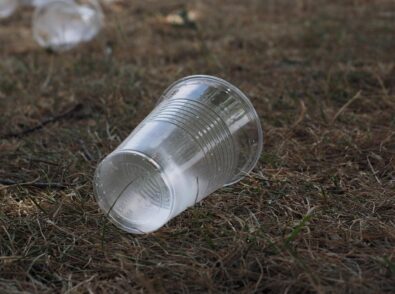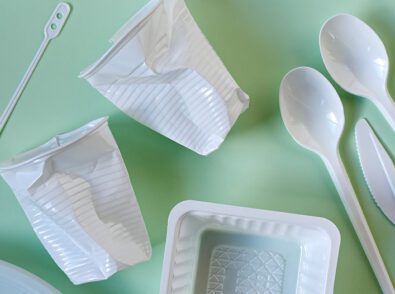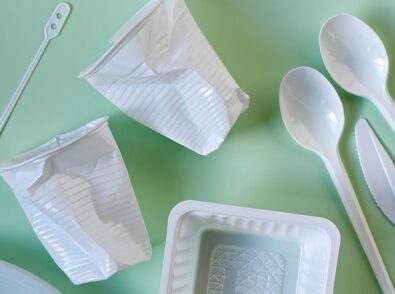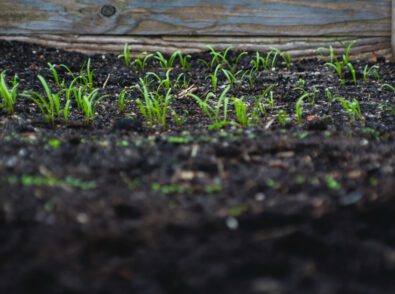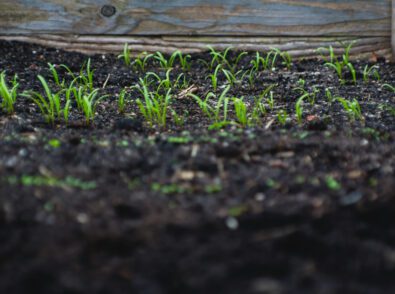Understanding Different Materials Used for Disposable Cups
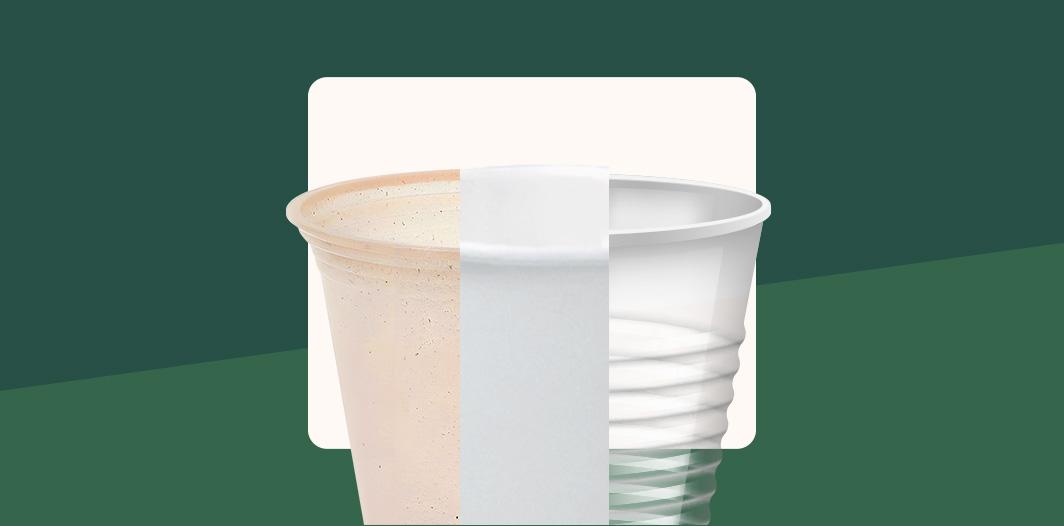
Disposable cups are a convenient and cost-effective way to ensure you have enough drinkware for in-store guests and to-go customers. They’re portable, easy to use, space-saving, and budget-friendly. With the number of disposable cup types available, it can be challenging to choose the right one for your needs.
Here we talk about different types of cups based on the materials used, their unique characteristics, and their strengths over others in the market.
Plastic Cups
Arguably the most popular type of disposable cup on the market, plastic cups are portable substitutes for traditional drinking cups. Lightweight and convenient, they offer businesses a cost-effective alternative to glassware. They’re also widely recyclable.
Polyethylene Terephthalate
Polyethylene terephthalate (PET) is commonly used for disposable cups, particularly for cold beverages. Known for its transparency, PET provides a clear view of the contents, making it a favorite among consumers. The shatterproof material offers durability while being lightweight. It’s cost-effective and easily recyclable.
Polypropylene
Polypropylene (PP) is another economical option for disposable drink cups. Like PET, it also offers durability and flexibility. PP has strong chemical and heat resistance, making it suitable for containers and packaging in the foodservice industry. Although less transparent than PET, it provides a good barrier to alcohol and moisture.
Polylactic Acid
Polylactic acid (PLA) is a biodegradable and compostable material used to produce disposable cups. Also referred to as a bioplastic, it comes from renewable sources such as sugarcane and corn starch. PLA also works as an interior lining for paper cups, providing a liquid-resistant barrier to the material. It’s suitable for hot and cold beverages when used in plastic cups.
Unlike other types of plastic cups, PLA cups can be broken down into compost or fertilizer. However, they are not recommended for reuse or washing due to the risks of releasing microplastics.
Biodegradable and Compostable Cups
Biodegradable and compostable cups are environmentally friendly alternatives to plastic cups. Manufactured using plant-based products, these materials naturally decompose after a certain period.
Agave
Agave-based cups are a sustainable alternative to plastic, wood, and paper drinking cups. Agave, an upcycled material manufactured from the waste fibers of tequila production, offers superior strength and durability. These characteristics make it an ideal option for drinking cups, cutlery, and other foodservice items.
Greenprint produces FSC-certified plant fibers for our agave-based cups, meaning they are sustainably sourced from responsibly managed forests. Agave cups are suitable for hot and cold drinks and are designed to degrade in the landfill within one to three years.
Cornstarch
Cornstarch is another eco-friendly option, providing a non-toxic, food-safe, and chemical-free replacement for drinking cups. It’s made from a renewable source and lessens reliance on petroleum-based products. Though they are less durable than plastic cups, cornstarch cups are strong enough to fulfill their function. They are lightweight and leak-proof, making them ideal for transporting hot and cold drinks.
Bamboo
Bamboo is a fast-growing plant that can be harvested without replanting. It’s a renewable resource that can thrive with less water and even without fertilizers, making it an environmentally friendly option for producing disposable cups. It has natural insulation properties that help keep beverages hot or cold longer than other types of disposable cups, so lightweight and durable bamboo cups are ideal for on-the-go use.
Sugarcane
Sugarcane-based cups are made from bagasse, the leftover fiber from sugarcane juice extraction. They’re a sustainable substitute to plastic cups, offering durability, biodegradability, and resistance to water and grease. Sugarcane-based cups also provide superior insulation, which is great for hot and cold beverages. Plus, they can withstand heating or reheating in the microwave.
Paper Cups
Paper cups are disposable cups usually made using paperboard with a thin layer of wax or plastic. They’re meant for single use and are suitable for both hot and cold beverages. A disposable paper cup is a popular choice for consumers due to its affordability, portability, and convenience of use and disposal.
Single-Wall
Single-wall paper cups are known for their single-layer construction. Known for being lightweight and versatile, this type of disposable cup is suitable for hot and cold beverages and costs less to manufacture. Due to their budget-friendliness, single-wall paper cups are ideal for customization, providing marketing opportunities for brands with minimal environmental impact.
Double-Wall
Double-wall paper cups, on the other hand, are typically designed with two layers of paperboard. Their construction allows air in between the layers, providing better insulation and durability than single-wall paper cups. The thicker composition also provides added protection for hot drinks, reducing the need for cup sleeves. Like single-wall paper cups, double-wall types are also highly customizable and offer an eco-friendly option.
Foam Cups
Foam cups have a reputation for being one of the most cost-effective disposable cups to produce. Made of expanded polystyrene (EPS), they’re more affordable to manufacture than paper and plastic cups, plus they offer superior insulation and retain the portability of a typical disposable cup. In terms of environmental friendliness, however, foam cups do not biodegrade and are not generally accepted at recycling facilities.
Polystyrene Cups
Made of high-impact polystyrene (HIPS), polystyrene cups offer excellent insulation and durability with their shatterproof and crack-resistant properties. Like PET cups, polystyrene cups are transparent, allowing consumers to see the content. They’re also lightweight and stackable, contributing to their portability and storage optimization qualities. However, polystyrene cups are not biodegradable under ASTM standards and may not be the best choice for reducing plastic pollution.
Choosing the Best Eco-Friendly Disposable Cups
Each disposable cup material offers unique strengths and weaknesses. Choosing the best types of cups for drinking ultimately boils down to your priorities as a brand or consumer. Here are a few considerations when selecting an eco-friendly disposable cup for your business:
- Assess your priorities. Are you looking for the most affordable solution, or do you prefer eco-friendly alternatives? Knowing your priorities helps narrow down the options. For example, agave and other plant-based cups are ideal for eco-friendliness, while polystyrene and PET cups are great options for durability.
- Consider your budget. Foam and paper cups are more affordable to produce, while plant-based cups cost more due to resource costs and manufacturing complexity. If you consider the long-term benefits, plant-based cups like agave, bamboo, and cornstarch offer bigger cost savings and environmental benefits.
- Determine the intended use. If you’re using the cups for a special event or for marketing purposes, going the paper route can be ideal as paper cups offer customizability without hiking up the costs too much. Agave cups also offer diverse customization options in terms of shapes and sizes, which is ideal for businesses selling drinks in various sizes.
There are several factors to consider when choosing a disposable cup for your business needs. While some materials appear to have the upper hand in terms of cost savings and ease of use, others may prove to be a more sustainable choice in the long run.
If you’re looking at a product that ticks all the boxes, agave cups offer superior benefits in biodegradability and cost-effectiveness. Read Greenprint’s guide to buying disposable cups for additional information on choosing the most appropriate drinking cups for your needs.
Pursue Sustainability With Environmentally Friendly Drinking Cups
Greenprint is committed to providing clients in the foodservice industry with sustainable options for cups, cutlery, and packaging. Our selection of agave drinking cups and other plant-based products offers businesses an eco-friendly way to elevate their services without the high costs. Contact our sales team for more information and pursue the green path to sustainability.

